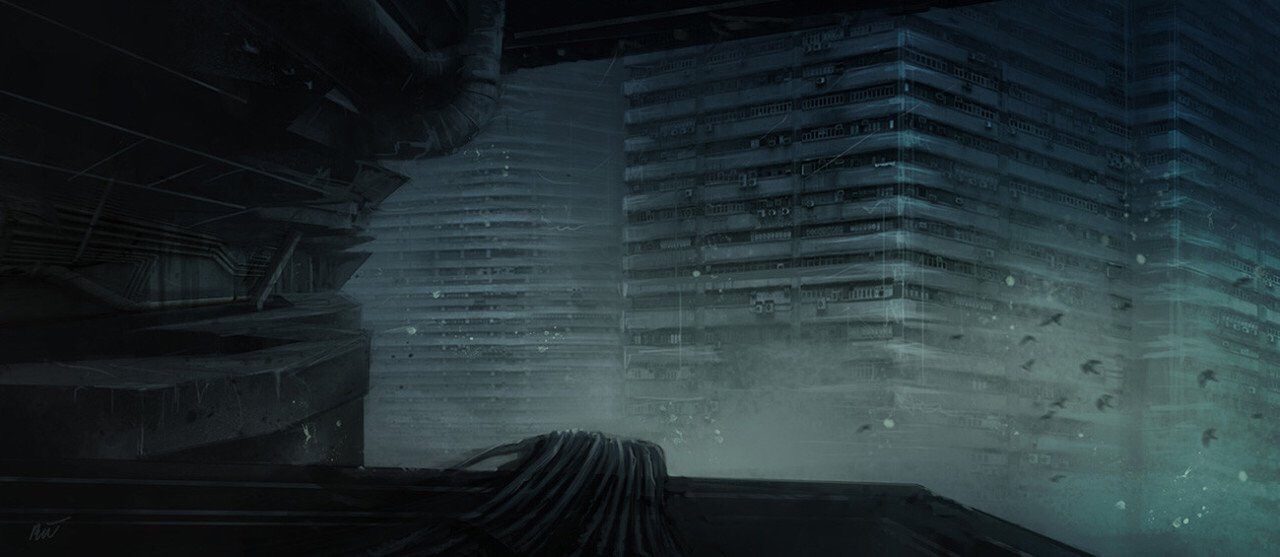Funneled by the glass and concrete monstrosities that defined the city’s skyline, a chill wind whipped past the lithe elf secluded in a shallow alcove nearly thirty stories above the busy streets below, snapping at her short leather jacket. The electronic countdown’s ghostly numerals pulsed with each passing second, a small reminder overlaid at the corner of her vision of the precise time-table she was working under.
Rummaging through the sleek equipment bag she wore slung over one shoulder, she double-checked that her tools would be adequate to the task at hand. Information had been sparse, corporations enjoying their secrecy – particularly when it came to details about their surveillance systems – and space had been tight, meaning she only had a limited selection of her normal array. Looking to the thick telecommunication conduits which snaked through and around the alcove, she nodded to herself; her suspicions had been right and her tools would be sufficient.
As her countdown continued inexorably toward the appointed moment, three green checkmarks appeared in the corner of her eye – the team was in place. “Team” was a funny word to describe them, she thought, four strangers brought together due to their unique skillsets and penchant for keeping quiet. After the job was done they’d go their separate ways, and likely wouldn’t ever see one another again. Trusting the rest to be professional and able to handle their assigned duties, everyone’s life relied on the careful execution of carefully-orchestrated tasks, with little room for error or improvisation. Either the operation would go smoothly and according to plan, everyone walking away with a well-earned paycheck, or things would go bad very quickly, and their handlers would disavow any knowledge of the team or their plans. No room for half-measures.
There was a sharp trade-off, working freelance. She couldn’t have the same level of personal trust with the strangers she found herself paired up with, but alternatively she was the sole voice when it came to accepting or rejecting a job. Her old team had been a true benefit, until it wasn’t. No matter how professional an established team could be, interpersonal drama would turn cracks into deep divides, fracturing the whole. She wasn’t against the idea of joining a semi-permanent running team in the future, but greatly enjoyed the freedom and self-reliance that came with being a solo operator.
Readying her small monofilament saw – a Dremel-like cutter with near-infinite sharpness – she crouched low, trying to steady her bare hands against the churning wind. Gloves would have been much more comfortable, but at the cost of accuracy; the conduit she targeted had hundreds of fiber connections no thicker than a strand of hair and a single errant slip could alert the building to her presence. Inhaling slowly through pursed lips, she lightly touched the saw to the thick conduit as the countdown reached zero. A second timer appeared and began counting down, the limit for her careful infiltration of the corporate security network. Each team member had their own schedules, relying on one another to get each independent stage done in time to ensure a smooth infiltration.
Carefully holding the conduit open with millimeter-wide clamps, she separated the fiber strands within with a needle-like probe, quickly reading the optical signals each carried, seeking the specific line that would let other operatives advance their own schedules. The plan had been meticulously organized by her employers, with little to no input by the team itself. They had accounted for an impressive number of contingencies, but still managed to keep each runner siloed, ignorant of the specific aims or maneuvers of their compatriots. “Compartmentalization” was a concept she understood well, and working as a freelancer, had come to expect. Her role in the plan was necessary and important, whether ultimately as a distraction or integral requirement for others to obtain the information, package, or person they had been hired to collect.
For some not knowing the bigger picture was a deal-breaker, needing a wide-angle view to feel confident, comfortable. They wanted to understand the various moving pieces, to know how their role would contribute to the whole. Such people didn’t make it long as freelancers, where the money was good but information scarce. She was paid to accomplish very specific tasks at very specific times, and paid not to ask questions. She had been able to come to terms with that, as had the rest of her current team, presumably. Four strangers, hired to do some measure of illicit job, the ultimate aims of which were probably several orders of magnitude above their pay-grades.
As the second timer counted to zero, she carefully snipped the single specific optical cable she had identified, one of more than a hundred in the twisting bundle. A third countdown began, much longer than before.
All she had to do was avoid freezing until it was time for her next step, almost twenty minutes away. That and hope her teammates were as punctual as she.
This short insight into the mind of a freelance runner was inspired by the 1998 movie Ronin (highly recommended), Samuel Beckett’s 1955 absurdist theatre play Waiting for Godot, and the protagonist from Rachel Beck’s Glitch Logs series.















